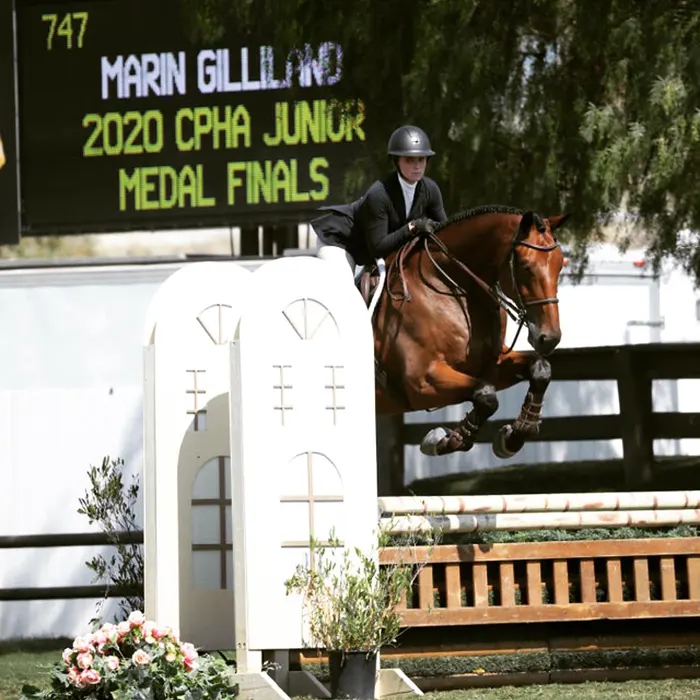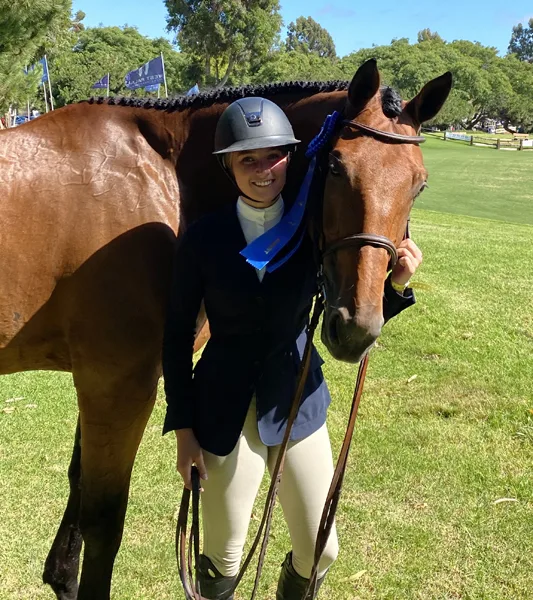In 2017, Marin Gilliland sat in the stands of the Alltech Arena at the Kentucky Horse Park watching the ASPCA Maclay Final, mesmerized as rider after rider laid down beautiful trips.
“I just watched round after round, and my parents were like, ‘OK Marin can we go back to the hotel?’ and I was like, ‘No! I want to see the second round! I want to see the work-off! Can I just stay for the night and watch?’ ” she recalled.
“When I watched the Maclay I said, ‘I want to do this so bad,’ ” she added. “ ‘I want to climb the ladder to this. I want to learn the basics and the fundamentals to get there.’ ”

Marin Gilliand showed regularly throughout California this season despite living in Hawaii and dealing with the islands’ quarantine restrictions. Amy McCool Photo
And this year Gilliland will fulfill that dream, making her debut in the 3’6” equitation finals at the Dover Saddlery/USEF Medal Final, held Oct. 10-11 in Mill Spring, North Carolina, before going on to the ASPCA Maclay Final in Lexington, Kentucky.
A native of Honolulu, Gilliland has spent plenty of time in an airplane since getting serious about the sport. She traveled from her home to Thermal, California, every weekend during the winter circuit this year to train and compete with Kost, Jenny and Nick Karazissis of Far West Farms in Calabasas.
“I’m very excited to be doing the [Medal],” Gilliland said. “I finally feel like I’m here. Sometimes I used to think, ‘I’m from Hawaii; maybe I’m not supposed to be here.’ Those were my thoughts in the back of my head. I was a little worried I wasn’t good enough. But once I settle into my ride, I feel good.”
Getting To Tryon
A fourth-generation horsewoman, Gilliland, 18, grew up riding modest mounts that taught her the basics—and how to stick a buck.
“At the beginning, I just rode whatever I could get on because we were not financially in a place to get a horse,” said Gilliland. “I would hang at the barn, and whoever needed something to be ridden would ask me. Appaloosa, western horses—anything anyone could throw at me, I was grateful. When I was about 12, we were finally able to buy this Paint horse. He was 15 and didn’t jump, but for me it was like, ‘Oh my God! We just bought this grand prix stallion!’ It was a huge deal.”
ADVERTISEMENT

“Whenever the scoreboard says Honolulu, Hawaii, I feel very proud,” says Marin Gilliland. Photo Courtesy Of Marin Gilliland
Gilliland got her big break after Nick came to Hawaii to judge a horse show and give a clinic. At the end of the clinic, he pulled her aside and suggested she come to California to train. Gilliland was ecstatic at the opportunity, but she had a problem: She didn’t have a horse. So she and her parents joined Nick at Maclay Finals that year to watch the class. On the final day, a big gray walked into the arena that caught Gilliland’s eye, and after a taking him for a test ride he boarded a plane bound for Honolulu.
Gilliland named him, appropriately, From Lexington With Love and kept his old moniker—Callipso—as a nickname. Gilliland traveled back and forth to ride with Nick, and he came to Hawaii to train her. Eventually, Callipso returned to the Far West Farms home base in Calabasas to stay closer to the horse shows, and Gilliland acquired a practice horse from the mainland to live in Hawaii to keep her legs strong.
Last year Gilliland qualified for Medal Finals but decided she wasn’t quite ready, so instead she traveled to Kentucky for the Hamel Foundation National Horse Show 3’3” Equitation Championship.
“I’m excited to do the 3’6” this year,” she said. “We’ve been doing really well in our 3’6” classes. We won the [Washington International Equitation Classic during the Desert Circuit (California)]; we won the Maclay at Del Mar [California], and I got a 93 in the [21 and under] CPHA Foundation Finals and finished 10th overall.”

Marin Gilliland has worked hard and put in the miles to make her way to this year’s Dover Saddlery/USEF Hunter Seat Medal Final. Sherry Bush Curtis Photo
Gilliland is especially excited to be reuniting with Callipso at the Medal Final after spending most of the season on other mounts. Last New Year’s Eve, Callipso got cast in his stall, injuring his stifle and humerus. Gilliland and the Far West team took their time rehabbing the 13-year-old Dutch Warmblood by Calido, giving him six months of downtime. In the interim, Gilliland leased two horses for the season, including Quinten F who helped her qualify for Medal and Maclay Finals.
During the Desert Circuit, Gilliland would fly five hours from Honolulu to California on Wednesday or Thursday, show, then on Sundays she’d fly overnight back to Honolulu so she could be at her desk for school. COVID-19 made things even trickier, as the Hawaiian government requires travelers from the mainland to quarantine for two weeks. (The state is now looking at relaxing that requirement by substituting a negative test result for quarantine.)

Marin Gilliland built a Hawaiian-style jump modeled after the famous ASPCA Maclay fence. Photo Courtesy Of Marin Gilliland
Caring For Horses In Tropical Paradise
When Gilliland is at home she rides her practice horse, Cortage, as well as Atlantic, a dressage horse who belongs to her mom, Sherry Bush Curtis. Gilliland shows Atlantic in fourth level rated dressage competition, schooling Prix St. Georges movements at home.
“I will say, it’s really an amazing lesson to be able to flip between disciplines,” said Gilliland. “Both of them complement each other. The dressage really helps with sitting in my equitation classes, because you can’t post past second level. In dressage, the equitation helps my timing because of distances because of strides and jumping.”
ADVERTISEMENT

Marin Galliland often rides her mother’s dressage horse, Atlantic, competing through fourth level. Photo Courtesy Of Marin Gilliland
During quarantine Gilliland had months with no trainers or lessons.
“I said, ‘Let me just hunker down with Cortage, work out, run and jump with no stirrups,’ ” said Gilliland, who also plays varsity volleyball for her school. “I was a little bit on my own for three to four months, just me and my mom setting up courses, practicing the medal tests. When I did start going back to California the work paid off; the strength was there.”
Despite the lack of recognized horse shows and elite training programs, Gilliland loves living and riding in Hawaii.
“It’s very special,” she said. “The surroundings are incredible, and my barn is in an area where it’s a rainforest. There’s a mountain range that’s around us and a dormant volcano. It rains a lot there, and it’s so green and very beautiful. As far as footing and equestrian facilities, it’s no Tryon, or any national horse show. The footing is decent. The horses are pretty backyard, and the arenas are small.”
There are a handful of farriers in Hawaii to choose from and one equine veterinarian who travels between the islands. Hay and other supplies are imported and are extremely expensive.
“Hawaiian horse care—I’m the groom; I’m the vet; I’m the clipper; I’m the mane puller; I’m the stall cleaner,” Gilliland said. “There are no grooms, no hired nothing. If you buy a barn you’re in charge of it.”
Though Gilliland is planning to attend college on the mainland and ride at school, she’s not letting go of her roots.
“Whenever the scoreboard says Honolulu, Hawaii, I feel very proud,” she said. “Sometimes I think, ‘Maybe I’m not good enough,’ or the judges might think I’m not worthy, but I love representing my state. I tell everyone to come to Hawaii. The riders are all really good, just underrated and under-seen.
“My emotional goal for this is that last year was the last year that someone from Hawaii won’t compete in Maclay Finals,” she said. “I’d love to see someone every year, every other year. I want everyone in Hawaii to be able to do it.”
















